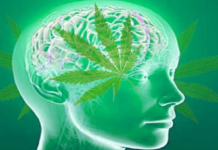
Cannabis sativa is arguably one of the most controversial, hotly debated, and valuable cultivars in the plant kingdom. With evidence of its use stretching back to 3500 BC, it has long been cultivated for hemp oil and fibers, as a food, medicine, and recreational drug.
Though hampered by the widespread criminalization of marijuana in the 20th century, the scientific study of cannabis as medicine has spanned over 20,000 peer-reviewed studies and clinical trials that support its significant therapeutic properties for a broad range of conditions and diseases.
The cannabis plant is composed of more than 500 chemical compounds. Of these, 104 have been identified as cannabinoids, a class of phytochemicals that affect neurotransmitters in the brain.
How Do Cannabinoids Affect the Brain?
As the body’s chemical messengers, neurotransmitters are tasked with receiving, processing, and sending information from one neuron to the next. When cannabinoids are consumed, they activate or inhibit specific receptor proteins located throughout the body. Identified as cannabinoid receptor type 1 (CB1) and cannabinoid receptor type 2 (CB2), they are part of the newly discovered endocannabinoid system and are involved in appetite, pain-sensation, mood, memory, and cognitive processes.
Of the 80 known types of cannabinoids, two of the most well studied are tetrahydrocannabinol (THC), the psychoactive component of cannabis that produces a euphoric effect when consumed, and cannabidiol (CBD) which exerts anti-inflammatory, antioxidant, anti-emetic, anxiolytic, anticonvulsant, and antipsychotic effects, but without the “high”.
10 Evidence-Based Therapeutic Uses For CBD Oil
Although various marijuana strains have been grown for medicinal or recreational purposes with potent THC levels and low concentrations of CBD, newfound interest in the therapeutic value of CBD has led to a range of cultivars that are high in CBD content with a low amount of THC. With these specially bred plants, CBD oil is extracted from the stalks and seeds and diluted with a carrier oil.
Let’s take a look at what the scientific literature says about how CBD affects the mind, body, and soul:
1. CBD Oil Relieves Pain
Just as willow bark was the inspiration for aspirin and the poppy led to the discovery of opium, plant compounds have a rich history in human pain relief.
Several studies have shown that CBD has a significant impact on inflammatory and chronic pain. In a 2006 animal study, CDB (taken orally or via injection) was capable of reducing persistent pain when administered daily for seven days. Another study found that CBD not only lessened the sensation of pain, but also helped reduce “affective pain” – or how we react to the unpleasantness of pain.
In human trials, Salivex (an oral spray composed of both CBD and THC) was an effective treatment for pain caused by rheumatoid arthritis, spastic pain in multiple sclerosis sufferers, and in patients with intractable cancer-related pain.
2. CBD Oil For Depression and Anxiety
Although CBD interacts with CB1 and CB2 receptors, it also appears to have an effect on serotonin neurotransmitters, which help regulate mood.
When compared with the medication Tofranil, CBD had a similar anti-depressant effect on mice in a 2010 study.
A single 600 mg dose of CBD oil 90 minutes prior to taking part in a simulated public speaking test allowed people diagnosed with generalized social anxiety disorder to perform with significantly reduced anxiety, cognitive impairment, and overall discomfort when giving the speech, according to a 2011 study.
Additionally, a case study explored how CBD oil might be used to treat symptoms of childhood post-traumatic stress disorder, such as insomnia and anxiety. Administered over a period of 5 months – before bed as a sleep aid and for on-the-spot relief from episodes of anxiety – CBD oil allowed the patient to sleep through the night with a noticeable improvement in day-to-day anxiety levels.
3. CBD Oil As a Treatment for Psychosis
The evidence also strongly supports that the CBD component of cannabis is a safe, well-tolerated, and effective treatment for psychotic symptoms of mental illness.
In a review of animal models and human trials spanning 30 years, psychosis was shown to improve with the use of CBD treatments. In patients diagnosed with schizophrenia, symptoms worsened when CBD was discontinued or when they were switched to conventional antipsychotic medications. Although the mechanism behind how CBD exerts an antipsychotic effect is still unknown, research suggests that it interacts with the striatum, temporal cortex, hippocampus, and prefrontal cortex – areas of the brain that are implicated in the development of psychosis and schizophrenia.
4. CBD Oil Eases the Side Effects of Chemotherapy
Over the course of the last two decades, medical marijuana has become a much more accepted treatment for a whole host of conditions, including helping to prevent and ease the adverse effects of chemotherapy.
Although more studies are needed to assess how CBD alone might help prevent chemotherapy induced nausea and vomiting, a study published in 2010 revealed that cannabis with THC and CBD in equal measure provided better protection than standard antiemetic therapies.
Other research suggests that CBD may be the active component in relief from cancer-related pain. Comparing the effects of treatments using either a combination of THC and CBD, THC extract alone, or placebo, researchers found that pain was significantly reduced with the THC and CBD therapy, while the patients given only THC extract responded similarly to the placebo group.
5. CBD Oil Possesses Anti-Cancer Properties
Showing a lot of promise as a potential anti-cancer treatment, CBD has been studied for its effect on several forms of cancer.
A review, published in 2013, looked at the available research on how cannabinoids affect breast, lung, brain, thyroid, and colon cancer lines, as well as leukaemia, lymphoma, and endocrine tumors. Like its counterpart THC, CBD also displayed plenty of anticarcinogenic properties, including anti-migratory, anti-invasive, and anti-metastatic activity. In in vitro experiments, CBD was able to target cancer cells while leaving normal, healthy cells unaffected. And because CBD is non-toxic, it could be safely used as a long-term therapy. While more research is needed, the authors conclude that the evidence strongly suggests that CBD is a potent inhibitor of both the spread and growth of cancer.
6. CBD Oil to Treat Acne
Even though acne is the 8th most common disease in the world, we are still lacking a definitive cure for this skin condition. Acne occurs when hair follicles become clogged with dead skin cells and oils, stemming from inflammation, sebum (oil) overproduction, and overactive sebaceous glands.
Because our skin is part of the endocannabinoid system, which regulates cell growth and sebum production, researchers have investigated whether CBD as a phytocannabinoid can have an impact on the underlying causes of acne.
In a 2014 in vitro study, CBD oil was found to inhibit “pro-acne agents” by normalizing oil production in skin, decrease the unwanted growth of sebocytes (cells that make up the sebaceous glands and excrete oils), and stymie the expression of pro-inflammatory enzymes that are known to cause acne.
7. CBD Oil May Help Prevent or Reduce Seizures
A seizure is a sudden surge of electrical activity in the brain. Brain cells either activate or stop other neurotransmitters from sending messages, disrupting the normal functions in the brain. When a person has two or more unprovoked seizures, they may be diagnosed with epilepsy.
Though the research is still very much in its infancy, two recent reports on CBD and seizures have provided some hope for people with treatment-resistant epilepsy.
The first is a survey of families who used CBD-enriched cannabis to treat their child’s seizures. Prior to turning to CBD, the average number of anti-epileptic drugs used was 12. Although the sample size was small, 11% of parents reported that CBD prevented seizures entirely, and 84% stated that CBD reduced seizure frequency. Of this last group, 42% stated seizures were reduced by more than 80% while 32% of respondents reported a 25% to 60% reduction.
Secondly, in an open label human trial, 214 patients aged between 1 and 30 years old were given CBD orally over a period of 12 weeks. Despite all participants having a type of epilepsy that is highly treatment-resistant, the effect of CBD was shown to reduce the frequency of monthly seizures by a median of 36.5%.
8. CBD Oil and Heart Health
Several studies have shown that CBD has numerous benefits for cardiovascular health, which could have far-reaching implications for diseases like diabetes, stroke, encephalitis, diabetes, and myocardial infarction.
Due to its anti-inflammatory and antioxidant properties, in vitro and in vivo experiments with CBD resulted in dilated arterial vessels to increase blood flow, a reduction in infarct size during strokes and heart attacks, and the prevention of tissue damage during cardiac events.
Used as a preventative, CBD oil was found to reduce blood pressure in healthy volunteers in a small 2017 study. After taking a single 600 mg dose of CBD, the researchers measured cardiovascular parameters of the participants at rest as well as after they took part in physical and mental stress tests. They found that, before and after stress, CBD reduced resting systolic blood pressure and stroke volume, while increasing heart rate when compared with the placebo group.
9. CBD Oil May Help Treat Addiction
Whether focused on drugs, gambling, food, or sex, all types of addiction follow the same biological processes and involve the brain’s reward system.
During the intoxication phase, addictive behaviors are rewarded via neurotransmitters that affect dopamine, opioid, serotonin, and norepinephrine levels. When the stimuli ceases, acute withdrawal symptoms such as anxiety, sleep disturbances, and fatigue may occur. Even if the individual abstains from the behavior, intense cravings and a low tolerance for stress may persist for months, often leading to relapse and the cycle begins anew.
Emerging research on how the endocannabinoid system may affect cravings and addiction suggest that cannabinoid receptors mediate the actions of opioid drugs in the brain to mitigate goal-directed behavior and habit formation, as well as reduce the excitability of dopamine neurons that are key to the intoxication stage.
Although THC has been shown to increase substance abuse risk, CBD may help break the addiction cycle. In studies involving both animals and humans addicted to heroin, one dose of CBD each day for three days curbed cravings at one hour, 24 hours, and 7 days after the last treatment was given. In addition to diminishing the desire for opioids, CBD helps with many withdrawal symptoms because of its inherent anti-anxiety, pain relieving, stress reducing, and anti-nausea properties.
Furthermore, in a 2013 study, a CBD inhaler was provided to tobacco smokers who wished to quit. Over the course of one week, they were instructed to use the CBD inhaler any time they craved a cigarette. Compared with placebo, those who consumed CBD reduced the number of cigarettes smoked by 40% during treatment.
10. CBD Oil is Neuroprotective
Glutamate is a major excitatory neurotransmitter that plays an important role in learning and memory. When glutamate is chronically over stimulated, a condition called glutamate toxicity, it can lead to numerous neurodegenerative diseases like Huntington’s disease and Alzheimer’s disease.
Research has long focused on developing a medication that will inhibit glutamate receptors or reduce glutamate levels in the brain. Preliminary research on cannabis has indicated that, while both THC and CBD possess antioxidant capacity to prevent neurotoxicity caused by glutamate, CBD was superior to both vitamin C and E as a neuroprotective agent and glutamate inhibitor.
The results of a 2014 study have revealed that CBD holds a lot of promise as a potential treatment for cognitive deficits caused by Alzheimer’s disease. Performed on mice genetically coded with Alzheimer’s disease, the researchers fed mice CBD daily from the age of 2.5 months to 8 months old. Compared with the control group, the mice treated with CBD did not develop poor facial recognition or experience social withdrawal – two of the hallmarks of Alzheimer’s disease. Although CBD did not have an effect on associative learning or anxiety, it did help hinder neuroinflammatory processes and was safe to use as a long term preventative treatment.
How To Use CBD Oil & Where To Buy It
While CBD is available as a tincture, topical cream, edible gummies, and as a vaporizer e-juice, many people find taking it in its pure oil form the easiest way to consume it.
A huge range of CBD products – including pure CBD oil – can be purchased from Daintri – a leading supplier of CBD health products. You can browse their range of products on their official website here.
Just place a few drops of CBD oil under your tongue. Hold it there for a minute or so before swallowing. This method allows fast absorption in the mucous membranes of the mouth so it can reach your bloodstream and interact with the endocannabinoid system quickly.
Alternatively, CBD oil can be added to water, juice, coffee, or smoothies. It can also be mixed with foods like olive oil, pesto, baked goods, and drawn butter. To prevent the beneficial compounds from being destroyed by heat in the cooking process, add the CBD oil to hot foods at the very end.
Unfortunately, there is no one size fits all in terms of dosage with CBD oil. Keep in mind that your body weight, the severity of the condition you wish to treat, the concentration of the CBD oil itself, and your individual chemistry are all considerations that will affect dosage amounts. Start with the recommended dosage stated on the bottle off CBD oil per day and adjust more or less to find your optimal dosage.
Is CBD Oil Legal?
The law is still relatively unclear and open to differing interpretations when it comes to CBD oil. While it is widely available almost everywhere, that doesn’t mean it is legal everywhere. At time of writing, according to CBDOrigin, there are eight states where you are free to use CBD products in any form without a prescription. These states include Alaska, California, Colorado, Maine, Massachusetts, Nevada, Oregon, and Washington.
There are a total of 46 states, including the eight above, where CBD is legal with a prescription for medical usage, although seventeen of these states have specific legislation related to the THC-levels within these CBD products. Use the tool at this page to see if CBD oil is legal in your state.



